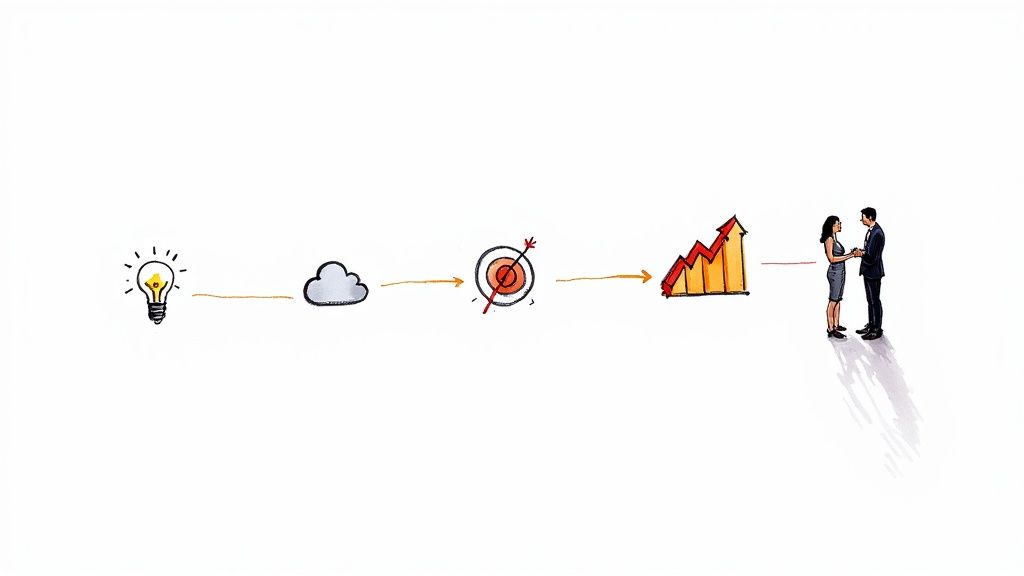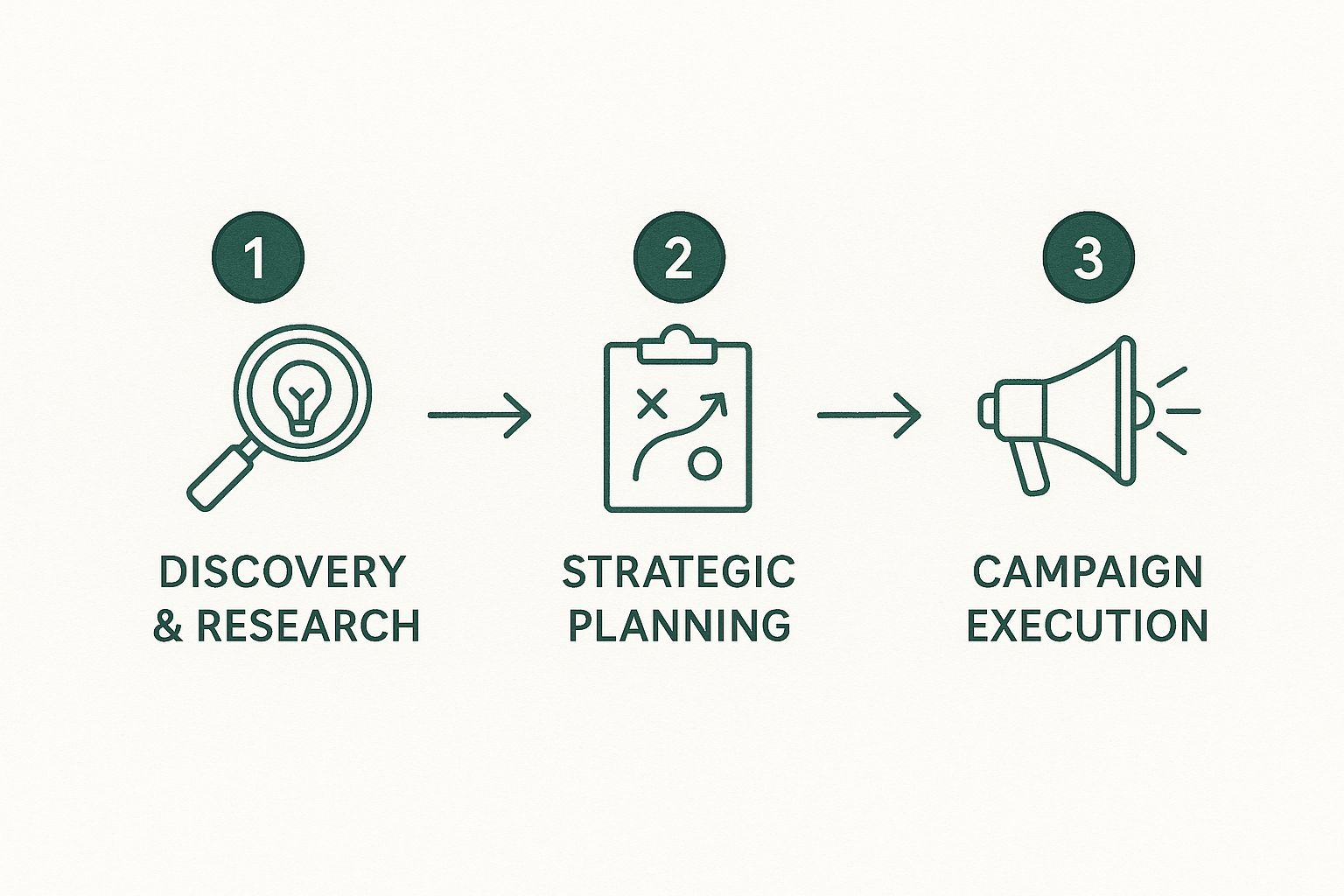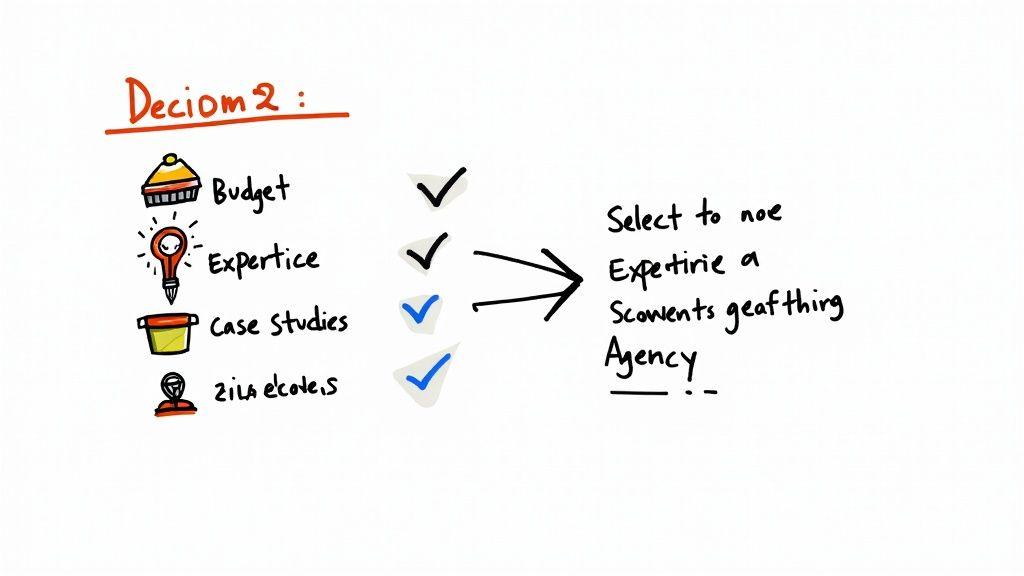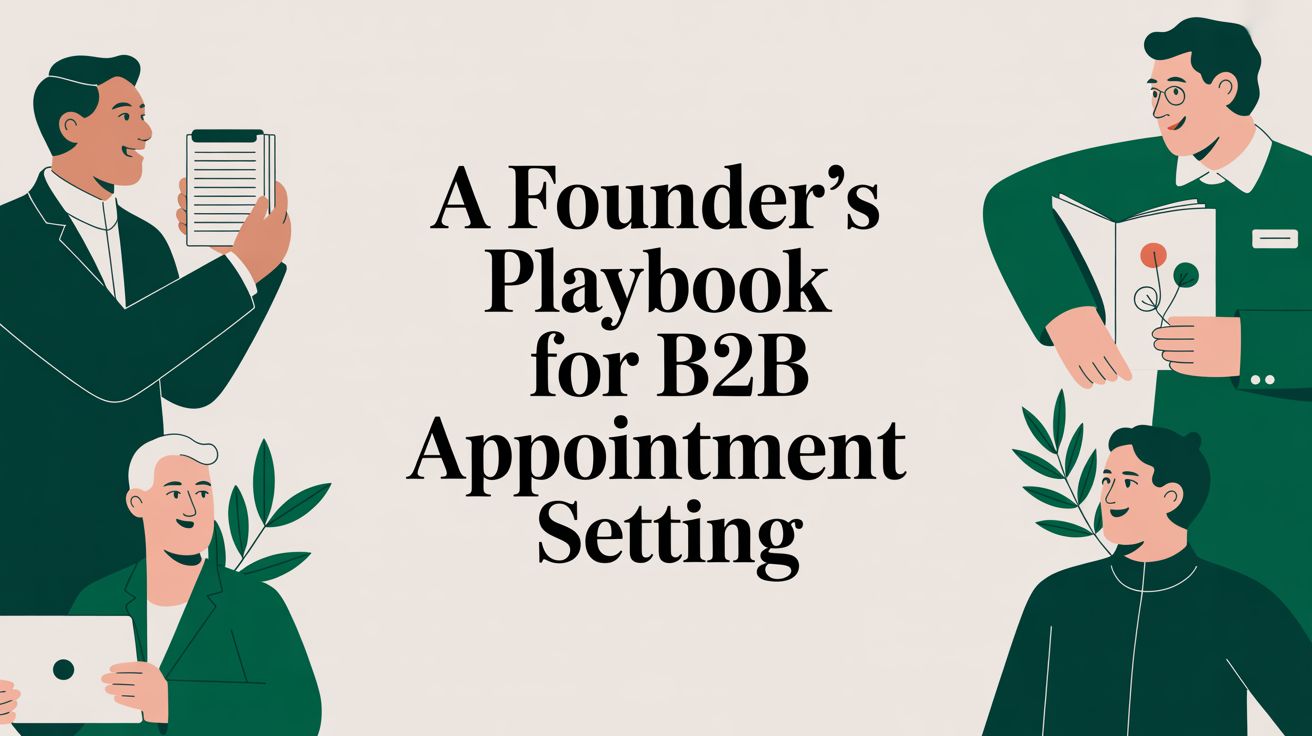Choosing the Best Agency for B2B Marketing | Expert Tips

Finding the right agency for B2B marketing isn't about outsourcing a few tasks. It's about bringing on a strategic partner who is just as invested in your growth as you are. You’re not hiring a vendor; you’re recruiting a core part of your team.
Your B2B Marketing Agency Is a Growth Partner

The days of relying solely on a traditional sales team and a list of cold calls are over. The B2B buyer’s journey has completely transformed. It's now a complex, multi-channel experience driven by digital interactions, thoughtful content, and data-backed decisions.
Your buyers are smarter and more informed than ever before. They conduct their own research, read reviews, and compare options long before they ever think about speaking to a salesperson.
This fundamental shift means your marketing has to work harder and smarter. It needs to educate prospects, build trust, and guide potential clients through a decision-making process that can easily last for months. This is exactly where a specialized agency for B2B marketing becomes indispensable.
The Scale of the B2B Opportunity
The sheer size of the B2B market really puts the stakes into perspective. The global B2B eCommerce market is expected to hit roughly $32.11 trillion in 2025 and grow to about $36.16 trillion by 2026. This massive expansion highlights just how critical sophisticated marketing has become for capturing even a tiny slice of that value.
A true agency partner understands this. They don't just run campaigns; they build the strategic framework that connects your product to the right audience, with the right message, at precisely the right time.
The right agency for B2B marketing doesn’t just bring in leads. They build the engine that powers predictable revenue growth, turning your vision into measurable business outcomes.
Moving From Tactic to Strategy
Thinking "I need a marketer" is a trap. It focuses on filling a seat instead of solving a core business challenge. The real goal is to find a partner who can accelerate your company’s growth trajectory.
This requires a change in how you think about the role. Your agency should operate as an extension of your leadership team, offering insights that shape your entire go-to-market approach. Their expertise helps you navigate complex decisions and spot opportunities you might have otherwise missed. You can learn more about the impact of expert B2B marketing consultants to grow faster in our dedicated guide.
Ultimately, choosing an agency is one of the most important growth decisions you'll make. It’s about finding a team that shares your ambition and has the proven ability to help you achieve it.
Defining What Success Looks Like for You
Before you even start Googling for a B2B marketing agency, you need a crystal-clear vision of your destination. Too many founders walk into agency pitches with vague goals like "more leads" or "better brand awareness." That's the equivalent of telling a pilot to "fly west"—you'll definitely move, but you won't land where you need to be.
True success begins when you translate your core business objectives into specific, measurable marketing outcomes. This clarity is your single most powerful tool in every agency conversation. It transforms you from a client with a fuzzy problem into a leader with a concrete plan.
So, let's dig deeper than surface-level requests. What's the real business challenge you’re trying to solve?
- Are you breaking into a new market and need to build credibility from scratch, fast?
- Is your sales cycle dragging on, meaning marketing needs to do a better job educating prospects before they talk to sales?
- Do you have a strong product but can't seem to get the right people to understand its value?
Answering these B2B-specific questions first helps you define what a "win" actually looks like for your business.
From Business Goals to Marketing KPIs
Your marketing objectives have to be directly tethered to your company's growth targets. If your main business goal is to increase annual recurring revenue (ARR) by 30%, a generic marketing goal of "more traffic" just isn't going to cut it. It’s not specific enough.
A much better, more aligned objective would be something like, "Increase Marketing Qualified Leads (MQLs) from our target enterprise segment by 40% within the next six months." See the difference? Now we're talking.
This infographic breaks down how a strategic B2B marketing agency connects the dots from high-level strategy all the way to execution.

This shows that great campaigns aren't just random acts of marketing; they're the result of deliberate, strategic planning rooted in your business goals.
The table below provides a practical guide for connecting those high-level business objectives with specific, measurable marketing goals and the KPIs you'll use to track them.
Translating Business Goals into Marketing Objectives
Having this level of clarity is non-negotiable. It ensures every dollar you spend is tied to a tangible business outcome, which is exactly how you justify marketing spend and prove its impact.
When you define what success looks like, it’s also crucial to understand how your potential agency plans to measure SEO ROI and prove its value. This ensures everyone is completely aligned on what you're trying to achieve and how you'll know when you get there.
Walk into every agency meeting with a well-defined brief. Knowing your numbers and objectives empowers you to lead the conversation and find a partner who can deliver on your specific vision, not just sell you a generic service.
This level of preparation is the difference between finding a true strategic partner and just another service provider. If you need a deeper framework for setting these critical benchmarks, our guide on how to measure marketing success for data-driven B2B growth is a great place to start.
With a clear definition of success in hand, you're finally ready to start evaluating potential partners on what truly matters.
What to Look for in a True B2B Partner

Let's get one thing straight: not all marketing agencies are cut from the same cloth, especially in the complex world of B2B. Picking the right partner isn't just about finding a team that can check off tasks on your to-do list.
You're looking for an extension of your own company. Someone who understands your industry, speaks your language, and is just as hungry for growth as you are. A true partner thinks beyond campaign metrics and obsesses over business impact.
The search can feel daunting. Top B2B agencies are growing fast because clients are trying to solve big problems like a lack of brand awareness (a headache for 47% of marketers) and a crowded market. This isn't just about running ads; it’s about building authority and connecting with sophisticated buyers in a meaningful way.
So, how do you cut through the noise and find that partner? You have to look past the slick presentations and zero in on three things that actually matter: their niche expertise, their relationship with data, and how well they’ll actually work with your team.
Deep Niche Expertise
Generic marketing advice is useless in the B2B tech and SaaS space. You need a partner who lives and breathes your world—the long sales cycles, the multiple stakeholders, and the technical nuances of your product. Don't be shy about putting them on the spot.
Ask for specific case studies from companies that look like yours. You're searching for concrete proof that they’ve solved the exact problems you’re facing right now.
Here are a few questions to get the conversation started:
- Show me a campaign you ran for a B2B SaaS company that actually shortened their sales cycle.
- How do you create content for a highly technical audience without oversimplifying it?
- What’s your experience marketing a product that requires a heavy educational lift before a customer is ready to buy?
Their answers will quickly reveal whether they have B2B in their DNA or are just a generalist agency.
Transparency in Data and Reporting
In B2B, data is king. A great partner won’t distract you with vanity metrics like clicks and impressions. They will draw a straight line from their marketing activities to your pipeline and revenue. That requires a totally transparent, collaborative approach to analytics.
You should expect clear, consistent reporting that tells a story—what's working, what's not, and why. If an agency gets cagey about giving you access to their dashboards or can’t explain how they measure success in plain English, that’s a massive red flag.
A true partner brings data to every conversation. They don't hide behind jargon; they use insights to challenge your assumptions, find new opportunities, and make smarter decisions with you.
This kind of strategic thinking is often what separates a doer from a leader. To get a better sense of this high-level perspective, it’s helpful to understand what a fractional CMO does and how that mindset can shape an agency partnership.
Cultural Fit and Communication
This might sound like a "soft" skill, but don't underestimate its importance. You're entering a long-term relationship, and a clash in communication styles or work ethic can poison it from day one. Are they proactive, or do you constantly have to chase them for updates?
Think about a difficult scenario. A key campaign is underperforming right before your quarterly board meeting. Do you want a partner who calls you with a plan, or one who waits for you to spot the problem? That alignment is what turns a simple vendor into a resilient, indispensable partner.
How to Assess an Agency's Tech and Data Skills
Modern B2B marketing isn't about guesswork. It's powered by data and the technology that makes sense of it all. You need an agency that can do more than just rattle off a list of popular tools. They have to be able to dive into complex data and pull out actionable insights that actually shorten your sales cycles and prove a clear return on investment.
But how do you separate the real data experts from the pretenders? It comes down to looking under the hood of their tech stack and their approach to data. It’s not about if they use AI, but how they use it to generate tangible results for B2B companies like yours.
Digging into Their Tech Stack
Start by asking about the specific tools they use across marketing automation, analytics, and CRM. Don't stop there, though. The real test is how they get these systems to work together. A fragmented tech stack is a surefire recipe for lost data and missed opportunities.
Get past the buzzwords with pointed questions that gauge their real-world capabilities:
- "How will you integrate data between our CRM and your marketing automation platform?" Their answer needs to be more than "we use a connector." They should detail a clear process for ensuring seamless data flow, which is the absolute foundation for effective lead nurturing and accurate reporting in a B2B context.
- "Walk me through an example of how you used predictive analytics to improve lead scoring for a client with a long sales cycle." This question pushes them beyond theory. It forces them to demonstrate a practical application and, more importantly, the results they achieved.
- "What's your process for maintaining data hygiene across platforms?" Clean data is everything. Any B2B marketing agency worth its salt will have a rigorous, non-negotiable process for this. If they stumble here, it's a major red flag.
From Data to Decisions
Having the right tools is only half the battle. The real magic happens when an agency can translate raw data into smart, strategic decisions. Honestly, this is where many of them fall short.
You’re looking for their ability to articulate specific conversion rate optimization tips based on actual user behavior data from a client, not just quoting generic best practices they read in a blog post.
There's a reason the investment in B2B marketing data is exploding. U.S. spending is projected to accelerate to 4.0% growth by 2027, hitting an estimated $4.13 billion. This trend is all about the demand for better segmentation and pipeline growth, which is increasingly powered by AI. An agency that isn't fluent in data simply isn't prepared for the future. You can see more details on U.S. B2B marketing data spending trends on eMarketer.
An agency’s ability to turn analytics into revenue is the ultimate test of their technical skill. Ask them to walk you through a dashboard they created for a past client and explain the story the data is telling.
This focus on turning numbers into strategy is what separates the good from the great. A top-tier partner uses data not just to report on what happened last month, but to actively shape the future of your campaigns. To go deeper on this, check out our guide on how to approach B2B marketing analytics for sustainable growth.
Ultimately, you’re not just hiring a team to run software. You’re hiring a strategic partner to provide clarity and drive results.
Making the Final Choice and Starting Strong

You’ve done the hard work of vetting the contenders. Now it’s time to make the call and kick things off. This final stage isn't just a formality; it’s where you lay the foundation for a relationship that could define your company’s growth for years.
The goal here is to move from evaluation to execution without losing momentum. A strong start builds confidence on both sides and sets a positive tone for everything that follows. Let's walk through the final steps to get your chosen agency for B2B marketing set up for success from day one.
Conducting Insightful Reference Checks
Think of reference checks as your final line of defense against a bad partnership. Don’t just go through the motions here. This is your chance to get the unvarnished truth about what it’s really like to work with this agency day in and day out.
Forget the generic questions. You need to ask targeted, situational questions that reveal how they handle pressure, solve problems, and communicate when things don’t go according to plan.
- "Describe a time when a campaign wasn't performing as expected. How did the agency communicate this, and what steps did they take to correct the course?" This gets right to their proactivity and problem-solving skills.
- "How did they handle scope creep or an unexpected request? Were they flexible partners or did they point to the contract?" This uncovers their approach to collaboration when things inevitably change.
- "Can you give an example of a strategic insight they brought to you that you hadn't considered?" This is how you find out if they're true strategic thinkers or just order-takers.
The answers you get will paint a much clearer picture of their working style than any pitch deck ever could.
Defining the Partnership with a Solid SOW
The Statement of Work (SOW) is the constitution of your partnership. A vague SOW is basically an open invitation for misunderstandings, missed deadlines, and conflict down the road. It has to be meticulously detailed to ensure everyone is perfectly aligned from the start.
Your SOW should be so clear that a new team member could read it and understand exactly what success looks like, who is responsible for what, and when it's all due. Ambiguity is the enemy of results.
A rock-solid SOW needs to lock down a few key areas:
- Specific Deliverables: Never accept broad terms like "content creation." Insist on specifics, like "four 1,500-word blog posts per month on topics targeting enterprise CIOs" or "one 20-page downloadable ebook per quarter."
- Clear Timelines and Milestones: Detail every major milestone for the first 90 days. This should include the kickoff meeting, strategy presentation, first campaign launch, and the initial performance review.
- Reporting Cadence and Metrics: Define exactly what gets reported on and how often (e.g., bi-weekly performance dashboard, monthly strategic review). Crucially, you must also specify which KPIs will be tracked against your actual business goals.
The First 90 Days: A Blueprint for Success
The first three months are absolutely critical. This is where you set the pace, build a collaborative rhythm, and start banking some early wins to build momentum. A structured onboarding process ensures you transition smoothly from signing the contract to seeing results.
Your 90-day plan should focus on three things: alignment, integration, and execution. This is your roadmap for turning a brand-new contract into a powerful growth engine. Get this right, and your new agency partner will hit the ground running and start delivering real value from the very first week.
Common Questions Before You Sign on the Dotted Line
Even after you've done all the research, sat through the demos, and checked the references, a few practical questions always pop up right before you make the final call. That's completely normal. Choosing an agency for B2B marketing is a huge investment of both capital and trust, so it’s smart to get every last doubt cleared up.
Think of this as the final due diligence. Getting straight answers here will give you the confidence you need to move forward, knowing you’ve covered all your bases.
How Much Should I Expect to Pay?
This is the big one, right? The honest answer is: it varies widely. What you'll pay an agency depends heavily on the scope of work, their reputation, and the depth of expertise you need. But generally, you'll run into a couple of common pricing models.
A smaller B2B startup might hire an agency for a specific, one-off project—think a website redesign or getting your foundational SEO in order. That could run you anywhere from $5,000 to $25,000. For more comprehensive, ongoing work, retainers are the way to go.
A typical monthly retainer for a full-service B2B agency can fall anywhere between $10,000 to $50,000+. The number itself isn't the most important part; it’s the value and the expected return you're getting for that investment.
The goal is to find a price that makes sense for the business outcomes you’ve defined. If you need a hand framing this, our guide on B2B marketing budget allocation for top ROI tactics offers a really helpful framework.
Retainer vs. Project-Based Pricing
Getting your head around these two models is key to aligning expectations. They each serve a very different purpose, and the right one for you comes down to your immediate needs and long-term goals.
Project-Based Pricing: This is perfect for well-defined, one-time jobs with a clear start and finish line. We're talking about a product launch, creating a major piece of cornerstone content, or running a specific three-month lead gen campaign. It's transactional and laser-focused on a single deliverable.
Retainer-Based Pricing: This model is what a true partnership looks like. You pay a fixed fee each month for ongoing strategy, execution, and optimization. It's the go-to model for long-term growth activities like content marketing, SEO, and building out a demand generation engine. It gives the agency the runway to build momentum and adjust their approach based on real performance data.
For most B2B tech companies serious about sustained growth, a retainer is the only way to build a predictable revenue engine.
What Are the Red Flags to Watch for During the Pitch?
The pitch is where an agency brings out its best, but it's also where you can spot trouble if you know where to look. Be skeptical of any agency that sounds a little too good to be true.
Here are a few critical red flags to keep an eye out for:
- Big Promises, Vague Plans: If they guarantee you "page one rankings" or a specific number of leads but get fuzzy on the how, that's a massive warning sign. Real strategy has details.
- The Cookie-Cutter Pitch: Does their presentation feel like it could be for any company, or is it actually tailored to your industry and your unique challenges? Generic solutions almost never work in the nuanced world of B2B.
- The A-Team Vanishes: The senior partners might dazzle you in the pitch, but who is going to be in the trenches doing the day-to-day work on your account? Make sure you meet the people who will be your actual contacts.
At the end of the day, trust your gut. A true partner will feel collaborative, transparent, and genuinely invested from the very first conversation.
At Big Moves Marketing, we act as your fractional CMO, bringing over 15 years of B2B SaaS expertise to build the strategic foundation for your growth. We partner with founders to move from uncertainty to a clear, actionable plan that delivers measurable results. https://bigmoves.marketing
%20-%20Alternate.svg)


%20-%20white.svg)